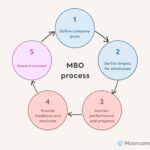Management-by concepts are structured yet varied approaches to leadership, offering targeted recommendations for designing effective management systems. These concepts often address only specific aspects of leadership, making them tools that can be selectively applied depending on organizational needs.
Below are several widely recognized Management-by models:
Management by Decision Rules
Management by Decision Rules focuses on defining decision-making guidelines in the context of delegated tasks. It regulates what decisions are made, when they are made, and by whom, particularly in recurring, routine scenarios. This approach increases consistency and clarity in task execution through formalized rule-setting.
Management by Exception (MbE)
Management by Exception operates on the principle that supervisors should concentrate on overarching management responsibilities, while subordinates handle task execution and related decisions. Managers only intervene in exceptional cases, such as when defined decision limits are exceeded or unexpected issues arise. Thus, managerial involvement is limited to outlier scenarios, enhancing efficiency in day-to-day operations.
Management by Results (MbR)
Management by Results is a strictly results-focused approach. Goals are predefined, and supervisors externally monitor performance. The sole performance metric is the outcome, not the process, making it ideal for settings where deliverables are more critical than methodology.
Management by Participation
Management by Participation encourages employee involvement in the goal-setting process. By giving team members a voice in defining objectives, it fosters engagement, ownership, and accountability.
Management by Delegation
Management by Delegation increases organizational efficiency by assigning tasks to subordinates. This model promotes autonomy and resource optimization while allowing supervisors to focus on strategic priorities.
Management by Motivation
Management by Motivation builds upon participatory models by also granting employees a self-directed work environment. It combines goal involvement with personal accountability and self-monitoring, encouraging intrinsic motivation and long-term engagement.
Management by Objectives (MbO)
Management by Objectives is a comprehensive leadership model that integrates both goal-oriented and behavior-based elements across all organizational levels. The core idea is to break down overarching company goals into operational objectives through a cascading system. A participatory approach—often using a countercurrent process—ensures mutual agreement on goals. Employees are responsible for the actions needed to meet their targets.
Performance evaluations are based on target/actual comparisons, highlighting both individual deficiencies and areas for systemic improvement. However, the model presents two key challenges:
-
Assumption of perfect goal alignment across all levels, which is difficult due to varying operational realities and the complexity of measuring outcomes.
-
Over-reliance on goals as control instruments, which may be less effective than clear instructions in certain well-structured tasks or for employees with diverse motivational drivers.






![15 Employee Offboarding Templates That Save Hours of HR Time [Free Downloads] 15 Employee Offboarding Templates That Save Hours of HR Time [Free Downloads]](https://i1.wp.com/www.hrcloud.com/hubfs/Header.png?w=150&resize=150,100&ssl=1)
